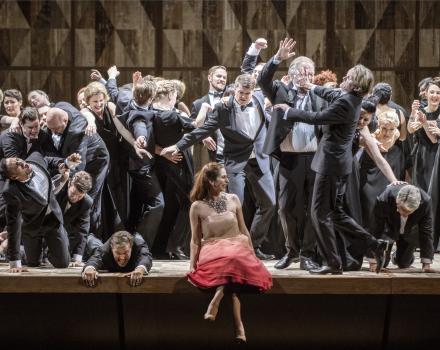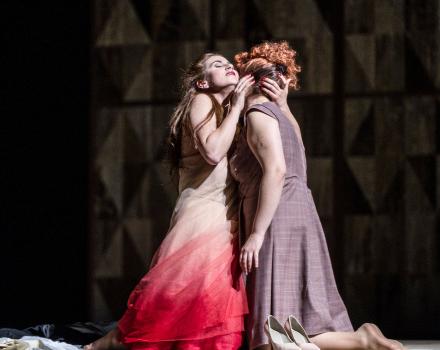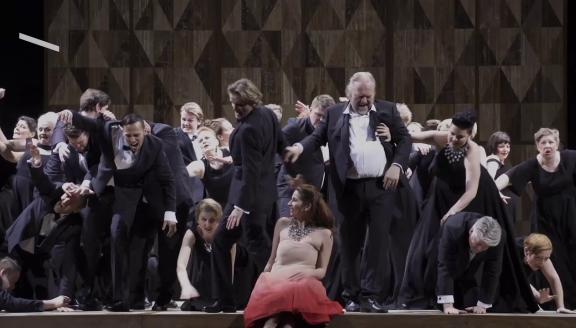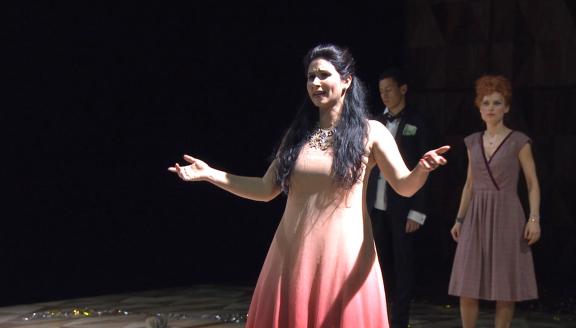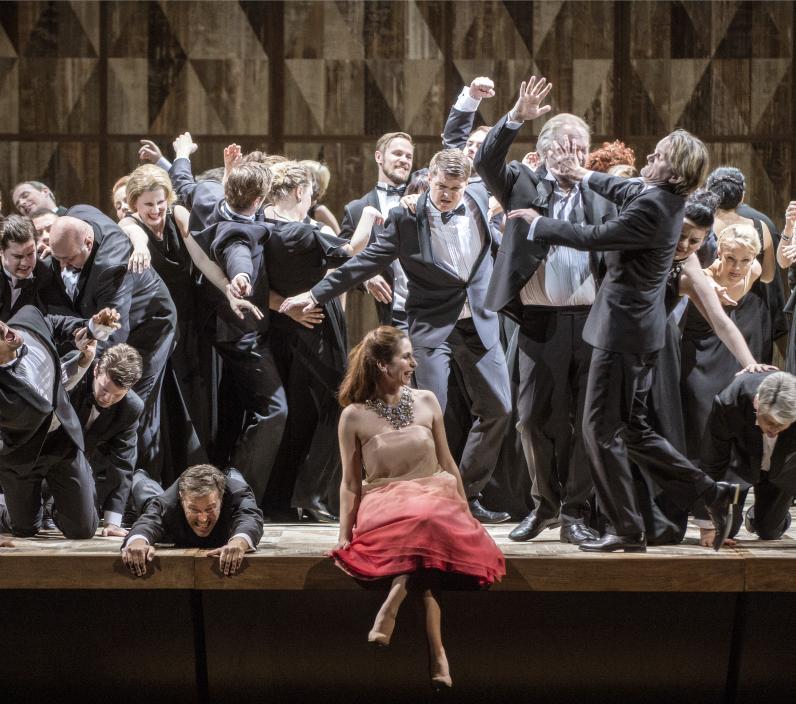

Opernwelt magazine 'Stage director of the year' in 2013, Tatjana Gürbaca offers a refreshing view on one of Verdi’s most famous operas.
Cast
Violetta Valéry | Aurelia Florian |
|---|---|
Alfredo Germont | Matteo Lippi |
Georgio Germont | Yngve Søberg |
Annina | Caroline Wettergreen |
Barone Douphol | Martin Hatlo |
Doktor Grenvil | Jens-Erik Aasbø |
Flora | Johanne Højlund |
Floras Tjener | Rolf Conrad |
Gastone | Eivind Kandal |
Un commissionario | Pietro Simone |
Marquis d’Obigny | Ole Jørgen Kristiansen |
| ... | |
Music | Giuseppe Verdi |
|---|---|
Conductor | Julia Jones |
Director | Tatjana Gürbaca |
Sets | Henrik Ahr |
Lighting | Stefan Bolliger |
Costumes | Barbara Drosihn |
| ... | |
Video
The story
Act I
At a party thrown by the sought-after courtesan Violetta Valéry for the rich people of Paris, the latter meets Alfredo Germont, a young man from the provinces who has secretly been in love with her for a year. Violetta swears that instant gratification is all that has meaning in life, but nevertheless she cannot keep her eyes off Alfredo and the effect he has on her – not least because at the first opportunity he declares his love for her in the most fervent terms. When they part she gives Alfredo a sign indicating that he may return the following day. After the party is over, she is ready for a new life with Alfredo.
Act II
Some months later. Violetta has completely broken from her Parisian friends and has moved back to the country with Alfredo. When Alfredo realises that Violetta is secretly selling her own property to finance their life together, he is ashamed, not wishing to be supported by a woman. Alfredo's father, Giorgio Germont, seeks Violetta out while Alfredo is away. He demands that Violetta renounce Alfredo so as not to endanger the family's reputation and the forthcoming wedding of Alfredo's sister. Under great pressure, Violetta finally gives way.
She tries to assure herself one last time of Alfredo's love, before leaving in secret. She leaves behind a letter telling Alfredo that she has left him and returned to her old existence in Paris. Giorgio Germont tries to persuade his broken-hearted son to return home to his family, but his attempts are in vain: Alfredo is intent on travelling to Paris to revenge himself on Violetta.
At Flora's party, the word spreads that Violetta has gone back to her former lover Baron Douphol, and the guests look forward to confronting her after her disappearance from society. Alfredo also arrives and wins a large sum of money at the gambling tables. Violetta privately asks Alfredo to leave the party because she fears for his life. Following an angry confrontation, Alfredo throws the money at her feet in full view of everyone to 'pay' her for her services. Germont witnesses the scene, and in the midst of the commotion he rebukes Alfredo, who immediately reproaches himself. Finally, the Baron challenges Alfredo to a duel.
Act III
Violetta is alone and close to death. Giorgio Germont has written to her to say he has told Alfredo of what really happened, and that Alfredo wishes to see her. While Violetta is bidding farewell to life, a carnival is taking place in Paris. When Alfredo finally arrives, a desperate Violetta conjures up an illusion of a future with him. Germont's prayer for forgiveness means nothing; it is too late. Violetta expresses a wish to be remembered as a woman who loved. She dies.
Insights
The inhabited desert called Paris
An interview with Director Tatjana Gürbaca
Giuseppe Verdi is an eminent political composer, which one can also see from his greatest successes: Rigoletto, which you staged at the Zurich Opera House, Il trovatore and La traviata. In all three works, the composer turns social outsiders to tragic protagonists on the opera stage.
It is no coincidence that Verdi had serious difficulties with the censorship authorities time and again. You have to imagine that at the time when he wanted to compose Rigoletto, the theatre play it was based on, Le roi s’amuse by Victor Hugo, was banned from the stage for many years. This is why he changed the location of the storyline in Un ballo in maschera many times, to dissociate the opera from historical models. The real model for La traviata, the courtesan Alphonsine de Plessis, died in 1847 at the age of 23; one year later, the novel The Lady of the Camellias by Alexandre Dumas, fils, came out, which he then developed into a theatre play two years later. So when Verdi decided to put it to music, the content was highly topical. The premiere of Verdi’s opera took place already in 1853, in Rome.
Verdi, who was often mocked, in contrast to his contemporary Richard Wagner, was critically concerned with reflecting and making a statement in his operas on the situation in the society of his time.
Yes, Verdi was able to recount even historical subjects such as that of Don Carlos or Macbeth in a way that made them relevant in his time. To me, Verdi’s stories remain inexhaustible and there is a need to tell them today! Especially La traviata! In the 1st act of the opera, Violetta says what I think is one of the key statements in the opera when she describes Paris as an 'inhabited desert'. This represents a situation in society that we know from our time as well: soulless people without empathy in a big city who submit to the dictate of money as one-dimensional consumers. Those who do not follow these unwritten laws are mercilessly punished – just as Violetta is in Flora’s scene. The owner must not be deprived of the toy.
In fact, all of Verdi’s operas contrast a society without a true centre with a couple in love that creates an alternative world, opens a door to utopia so to say, and shows what the world could be like.
In La traviata, Verdi imparted a tragic dimension on the life and death of a prostitute. While her profession is gladly perceived as that of being a 'courtesan', Verdi himself gave it a clear name in one of his letters: 'whore'.
Verdi’s choice is truly remarkable, especially because the most serious operas of his time were otherwise about historical figures, rulers, noblemen in love and mad people. The subjects always had something sublime to them. To take a story from everyday life and to place this marginal figure at the centre is very modern.
So is Violetta – beautiful, fragile, selfless, sickly, and erotic – the typical female victim of 19th century opera?
On the contrary, she is an incredibly modern figure, downright emancipated. In the beginning, she is even 'the best material girl', the queen of exclusive parties in Paris that bring together the city’s richest people. She is the most sought-after prostitute, who earns a lot of money with her work. It is the illness that first enables Violetta to leave the fatal cycle of competition and acceleration. Suddenly, she asks herself what she wants to do with the time she has left, because it is no longer necessary to constantly earn money. For the first time in her life, she can do what she wants. When she meets Alfredo at the party in the 1st act, he offers her a stepping stone to freedom, because he comes at once with a term that did not exist at all in her world until then: love. For everything is allowed in this Paris society, except feelings. Love is a dangerous luxury, which you cannot afford because it makes you weak and vulnerable. Nevertheless, I do not think the encounter with Alfredo is a great love at first sight, but rather Alfredo becomes Violetta’s new project: 'For the first time, I could give myself away not for money, but out of a selfless feeling.'
I find it absolutely fascinating that there is a story of money in the opera, which is strongly connected with Violetta’s story. Money is what binds the people and each one tries to keep up a façade so as not to stand out and to belong. In the 1st act, Violetta earns money, in the 2nd act she sells all her possessions to fund her life together with Alfredo in the countryside. In the 3rd act, Violetta gives away her money to the poor. To formulate it in a more radical way: she basically burns the money because it no longer has value for her.
Violetta frees herself at the end of her life from what society holds as most valuable: money. Why does she die or what does it mean that she is portrayed through a fatal illness?
We did find a symbol for the disease, but for me it is more that the disease is a condition of taking a step back from the world in which she lives. Suddenly, Violetta looks at her environment through another lens and finds that she no longer wants to be part of it. I think Verdi understood the illness in symbolic terms. Verdi is not a realist like Puccini.
Verdi even explicitly forbid the singer to cough in the 3rd act.
In my view, Violetta dies from the emotional coldness of this world. When she dies, the music does not end in a soft or gentle way, but with fanfares. Violetta’s end is solitary; she is the great martyr. The character has great revolutionary potential, a moment for resistance. When we began to prepare the opera, there was a strong Occupy movement in Spain. There, women were dancing Flamenco at bank counters in protest to raise awareness for the country's actual culture, for how everything is destroyed by the money economy, and asserted their dignity. This is Violetta for me.
The fact that Violetta is portrayed in an inward way shows that she is very sensitive to the social environment until she can no longer tolerate it, does it not?
Yes, and it is wonderful that Violetta suffers from a lung condition. Her breath is strangulated, she can no longer breathe in this 'inhabited desert called Paris'. What a fantastic image! The blood spitting, which is part of TB, is also like an inner decay; Violetta bleeds from inside out.
Why does Violetta fall in love specifically with Alfredo, the really naive newcomer from the province?
There is a very beautiful moment in Dumas’ novel where she says: 'It is enough if someone gives me a compassionate look when I cough.' Obviously, Alfredo is the only one who shows empathy. It is the fact that he is someone who is not part of Paris society, does not know its rules and mean little games, it is his naïveté, his innocence and directness that initially attract and touch Violetta. The relationship then fails because of his naivete. Alfredo turns out not not to be strong enough, a dreamer. After the couple retreats to the countryside, he does not notice for a long time that Violetta takes care of their life together very effectively. Violetta now turns the whole thing around, she buys herself the man in a way. This is what makes this opera so scandalous, because now Alfredo is made into a prostitute. Not entirely, of course, because there are feelings involved, but now the woman is paying. It is interesting that Verdi did not compose a love duet for the couple in the countryside scene. Evidently, they live separate lives, they hardly meet on stage.
After the awful scene between Alfredo, Violetta and Flora, he immediately feels remorse for his brutal behaviour. Why does he not return earlier to the ill Violetta in the 3rd act?
Basically, whether Alfredo wants it or not, his father Germont is able to force him to live a very conventional life. I think it is a combination of several reasons. Alfredo misjudges the situation with Violetta, he does not understand what it really is about. He certainly fears a re-encounter, because then they would have to talk about everything that went wrong before. This would bring this great love into a very real realm, where it does not even belong. For this love, from the beginning, consists of projections on both sides, of mutual excessive demands from the outset. If the two would now talk, these beautiful images would be tarnished and destroyed.
So is Giorgio Germont the villain who drives the couple apart because he demands for Violetta to leave Alfredo?
No! In many productions, he is portrayed actually as Violetta’s antagonist. However, if we imagine the situation he finds himself in, the character becomes so much more multifaceted and interested. Germont is part of a different generation than Alfredo and Violetta, and represents completely different values. Germont tries to satisfy the convention to perfection. He has a heart, as shown by his wonderful music when he sings about his home and his family. There, we find out that family and not money is of utmost value for Germont. The father does everything to smooth the way for his loved ones, even if he has to be firm in the process. Germont is the only character in the opera who has no title and does not come from Paris, but from Provence. Evidently, he comes to Paris as a businessman to do business with the nobles. So Germont is under great pressure to get into this society and to belong to it.
Verdi’s operas always have moments that, in my impression, slide only into catastrophe, because a public, the choir, exerts pressure on individuals, which we will also experience with Germont.
When Germont visits the dying Violetta, he asks for her forgiveness. So Germont understood what he had done to her, but his compassion for Violetta comes too late.
The fact that Germont understands perhaps makes the whole thing even worse. A perpetrator who does not understand is amoral, because he has no morals. In contrast, Germont is amoral because he knows what he is doing to Violetta and still does it.
Is society Violetta’s actual antagonist – as is often the case in Verdi’s works?
It is the social structure in which Violetta operates. This is why we have the choir on stage more often than is indicated in the score. The choir is very important as the antagonist, on the one hand, and as a background for Violetta, on the other hand. The most exciting moments are the contrapuntal ones. When Violetta breaks away from, opposes social conventions, this is suddenly a real threat for the choir, as for example in the big duet of Germont and Violetta: Germont manages to get her to give up Alfredo to enable a better life for his sister. But then the music suddenly changes with 'Morrò' ('I will die'). She does not suffer at all and seems even aggressive to me with her strong fighter spirit, so dying almost becomes a threat. If someone like the Moroccan escort girl Ruby were to kill herself, quite a few politicians would stumble over the body. Such a woman is dangerous, because she knows a lot about the masters of society.
The interview was conducted by Bettina Auer
Gallery
